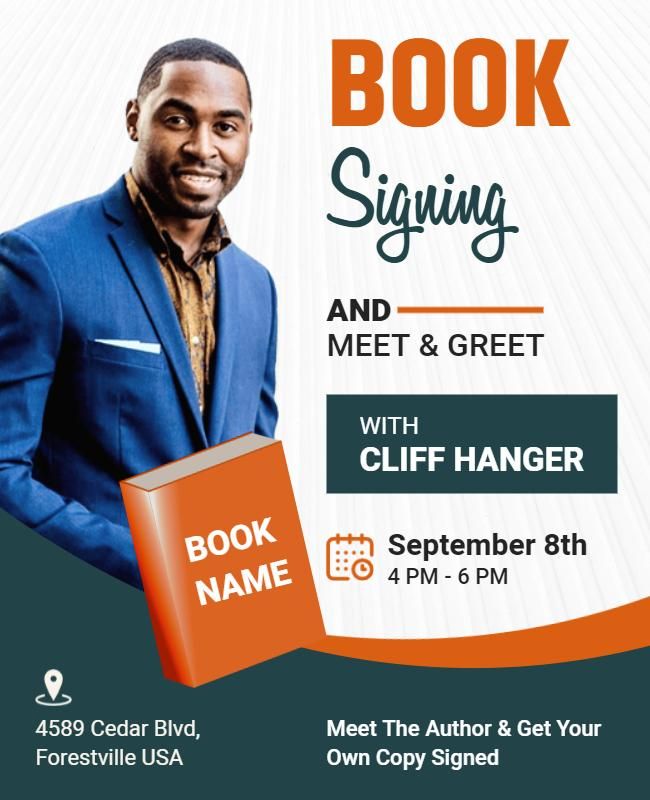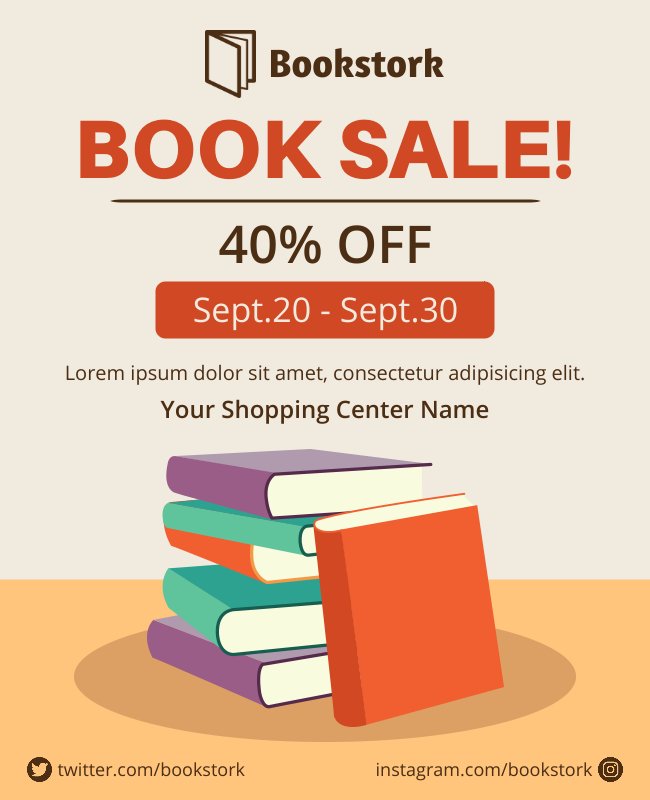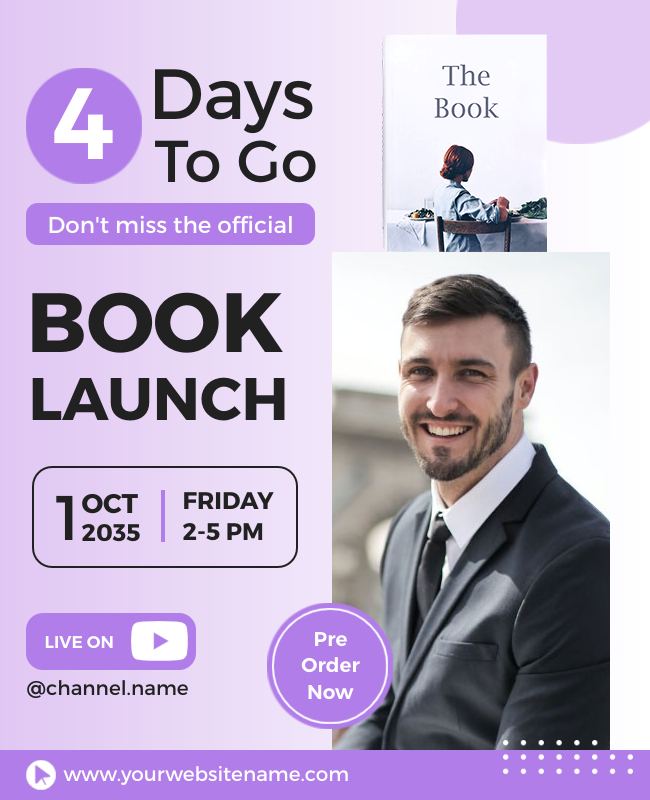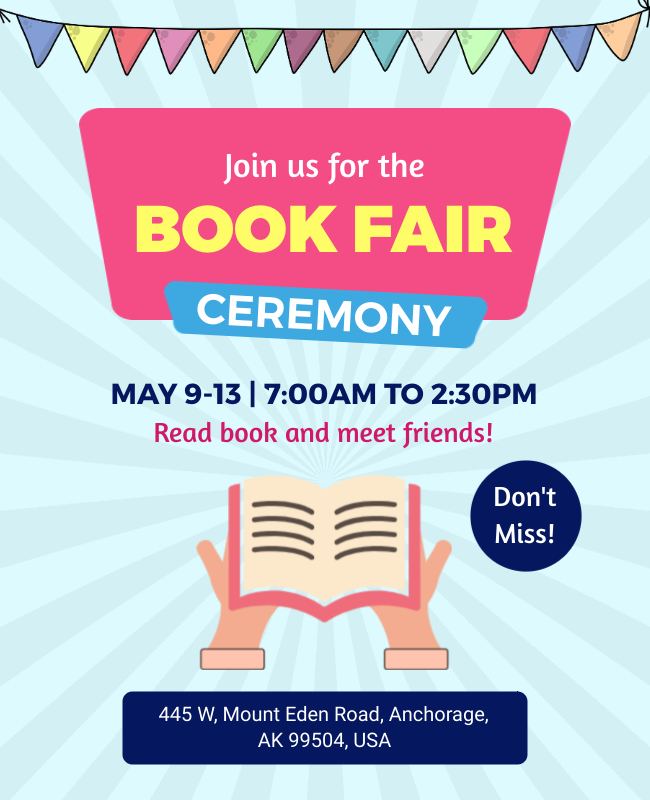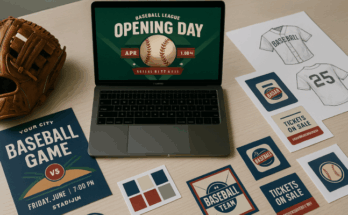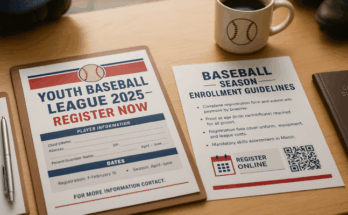When promoting your book, a well-designed flyer can make a huge difference. Book flyer templates provide an easy way to get started, and using them creatively can help you reach more readers. Book flyers are not just about showcasing your book’s cover — they tell a story, convey your book’s essence, and capture attention. In this blog, we’ll dive into the different types and styles of book flyers that will inspire readers to explore your story.
Why Book Flyers Are Still an Essential in the Digital Age
Even though we live in a digital world, physical marketing tools like book flyers still hold significant value. Here’s why:
- Tactile Appeal: Unlike digital ads, a flyer is something readers can hold and keep. It’s a tangible piece of your book’s identity.
- Standout in a Crowd: Flyers allow your book to stand out in crowded environments like bookstores, cafes, and literary events.
- Direct Distribution: You can distribute flyers directly to potential readers, whether at a local event or via mail.
A printed flyer can spark curiosity, while digital ads often get lost in the noise. Think about it: When was the last time a digital ad left a lasting impression? Flyers do.
The Power of a Physical Connection
A physical flyer can make an emotional connection with the reader. They might keep it on their desk or in their bag, reminding them of your book every time they see it. In contrast, online ads can get lost among many others.
A Tangible Reminder of Your Book
Having a flyer means potential readers have something they can touch and remember. It’s an item they can refer back to, even after an event or meeting.
How to Make Stunning Book Flyers
Creating a visually appealing flyer is essential for promoting your book and attracting readers. By following these simple steps, you can design an eye-catching book flyer in just a few clicks.
Sign Up on DesignWiz
Visit DesignWiz and create a free account to get started on designing your book flyer.
Search and Choose a Flyer Template
Browse through the book flyer templates and pick one that fits the theme or genre of your book.
Fill in Book Details
Customize the flyer by adding your book’s details—title, author name, release date, and a brief description or tagline.
Add Your Personal Touch
Personalize the flyer with images like your book cover, author photo, or relevant visuals. You can also include a catchy slogan like “A Thrilling Adventure Awaits!”
Preview, Download, and Share
Once you’re happy with your design, preview your flyer, download it in high quality, and share it on social media, via email, or print for distribution at events.
Key Elements for Designing a Book Flyers
Creating a book flyer that captures attention involves combining several essential elements. Here’s how you can design a flyer that makes a lasting impact:
Clear and Prominent Book Title
Your book title should be the first thing readers see. Make it bold, clear, and easy to read, especially from a distance. Our National Book Lovers Day flyer is a great example of keeping the title front and center.
Visuals that Reflect the Story
Use high-quality images that align with your book’s theme. If it’s a romance novel, soft colors and romantic visuals work best, while thrillers might call for darker tones or suspenseful imagery. For example, our Elegant Black National Book Lovers Day flyer features butterflies rising from an open book, perfect for evoking imagination and wonder.
Tagline or Hook
A compelling tagline or hook piques the reader’s interest. This brief line should give them just enough to want to learn more.
Strong Call to Action
Your flyer should direct the reader on what to do next — whether it’s visiting your website, buying your book, or attending an event. Clear instructions lead to action.
Font Choice and Layout
Make sure your fonts are legible and appropriate for your book’s genre. Consider pairing fonts for variety, but don’t clutter the flyer. Simple, effective design works best.
Matching your flyer design with your book’s theme is crucial. The colors, fonts, and imagery should reflect the tone of your book. For example, a thriller might use sharp fonts and darker imagery to evoke suspense, while a memoir might benefit from elegant fonts and subtle colors.
Strategic Placement of Book Flyers
The layout of your flyer is just as important as the content. You want your reader to easily find the most important details at a glance.
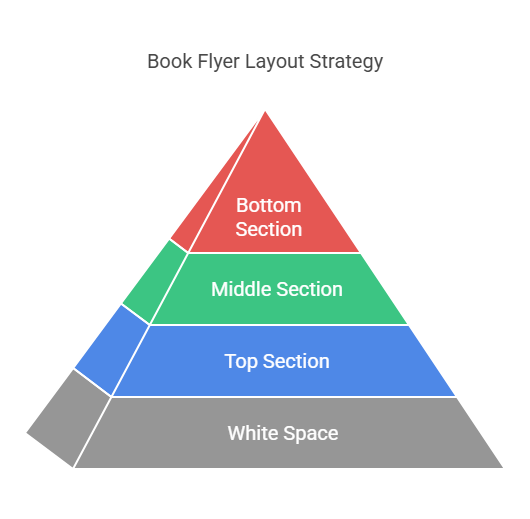
Top Section
Place your book title and cover image at the top. This makes the flyer instantly recognizable and gives the reader a visual connection to your book.
Middle Section
Use this space for a brief but compelling description of the book. Keep it short and to the point. Highlight the genre, plot, or unique selling points of your book.
Bottom Section
End with a clear call to action. Include where readers can buy your book or learn more (e.g., website, store links). If it’s for an event, make sure to add the time, date, and location here.
White Space
Don’t crowd your flyer. White space around key elements makes the flyer easier to read and ensures important info stands out.
By strategically placing your content, you make it easier for readers to digest the information and take action.
Popular Book Flyer Styles for Different Genres
The style of your book flyer should reflect the tone and genre of your book. Here’s a look at how different genres influence flyer design:
- Romance Novels: Soft colors, elegant fonts, and romantic imagery, such as flowers or hearts.
- Thriller/Mystery Books: Darker tones, bold fonts, and suspenseful imagery to convey intrigue.
- Fantasy/Sci-Fi Books: Rich, imaginative designs with futuristic or mystical elements.
- Nonfiction Books: Clean, straightforward layouts with professional fonts and minimal graphics.
- Yearbook Designs: Classic layouts, nostalgic themes, and a mix of candid and posed photos to capture memorable moments.
For example, Each yearbook flyer has a distinct style, from modern designs with bold typography to classic layouts with nostalgic colors. Yearbook flyer ideas include themed borders, school colors, and creative photo placements. These elements help capture memories in a visually appealing way.
Adapting Your Flyer to Genre-Specific Needs
Consider the emotional response you want your flyer to provoke. A fantasy book flyer might include fantastical imagery, while a mystery novel might rely on shadowy or suspense-filled visuals to build intrigue.
Targeting Specific Audiences
The genre and style of your flyer also help you target the right audience. If you’re promoting a children’s book, a playful design with bright colors might work well. On the other hand, for a serious nonfiction book, a clean, minimalist design might be more fitting.
Types of Book Flyers: Choosing the Right One
Book flyers come in different types, and it’s important to choose the one that fits your goals.
Event Book Flyers
These are perfect for promoting book signings, readings, or launches. Include key event details like date, time, and location, along with a catchy hook to grab attention. For instance, the Sophisticated Blue Book Signing Event Flyer demonstrates how a clean layout and elegant design can set the tone for a professional author meet-and-greet.
Promotional Book Flyers
Promotional Book Flyers focus on driving book sales with special discounts or limited-time offers. Use promotional flyers to effectively spread the word about your book’s availability and attract more readers.
Book Launch Flyers
If you’re releasing a new book, a launch flyer is essential. Highlight the book’s title, the release date, and any exciting features (like special offers or launch events). A good example is the Book Launch Event Promotion Flyer, which shows how clean design and bold title placement can create immediate buzz and draw attention to your book’s big debut.
Festival or Conference Flyers
If you’re attending a book fair or writer’s conference, a flyer tailored for these events can help you connect with potential readers and other authors. For creative direction, these examples of book fair flyers that effectively capture attention.
Choose the flyer type that aligns with your book’s needs. Consider whether you want to attract an audience for a specific event or drive sales through general promotion.
The Power of Consistency in Book Flyers
Consistency is crucial when it comes to promoting your book.
Visual Consistency
Keep the same colors, fonts, and design elements across all your promotional materials, from flyers to posters to your website. This helps build recognition for your book.
Messaging Consistency
The tone and message on your flyer should match your book’s voice. For example, if your book is a lighthearted comedy, the flyer should reflect that with a fun, playful tone.
Branding Your Book
Think of your book as a brand. Having consistent visuals and messaging makes your book stand out and helps it stay memorable in the minds of readers.
Unified Experience
When readers see your flyer, poster, and other materials in the same style, it creates a cohesive experience. This trust factor can encourage them to take action — whether it’s purchasing your book or following you on social media.
By ensuring everything looks and feels the same, you create a strong, unified brand that attracts and keeps readers.
Conclusion
Creating a book flyer that speaks to your readers takes time, but it’s worth the effort. Drawing inspiration from magazine flyers can help create visually engaging book flyers that capture attention. Follow magazine flyer ideas for design tips and inspiration to elevate your book’s promotion. Start by choosing the right flyer type and matching it with your book’s theme. Don’t forget that editable flyer templates can simplify the design process. Ready to get started? Create your own book flyer today and let your book shine!

